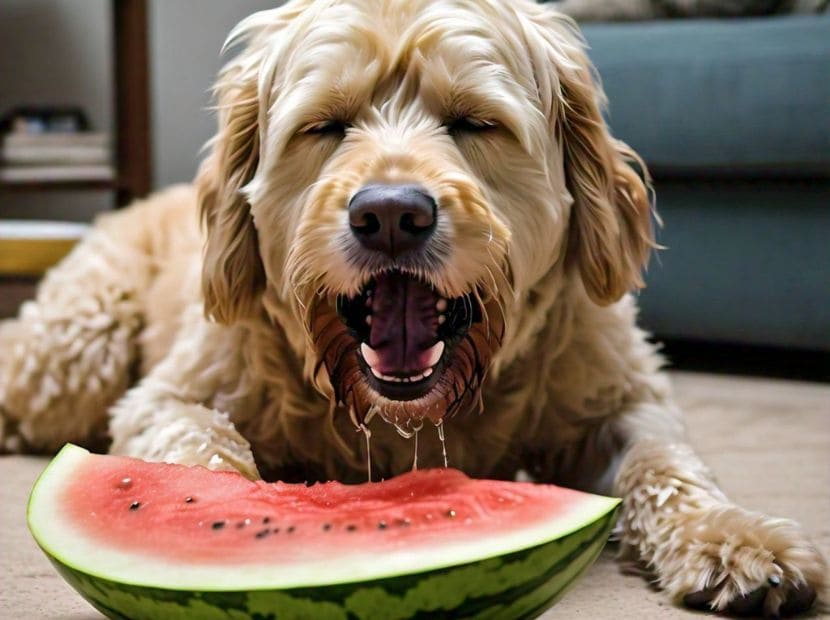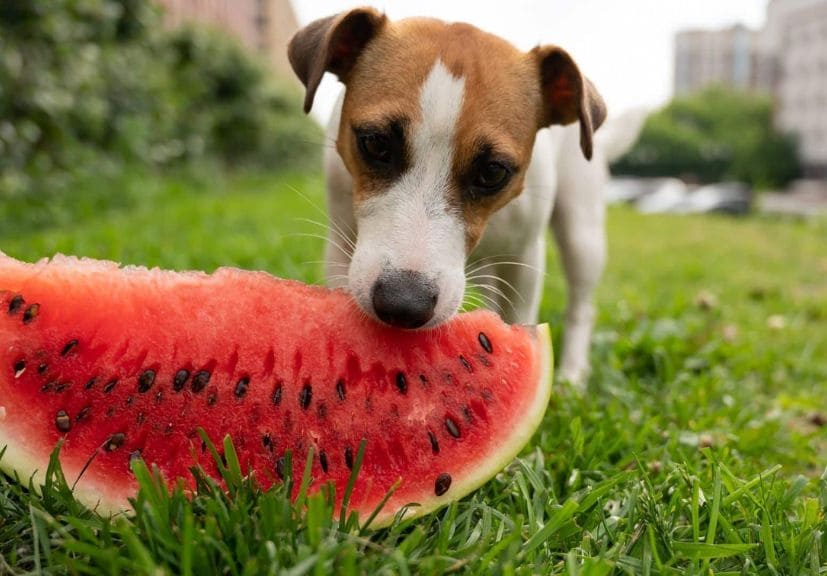Can Dogs Eat Watermelon?
While watermelon provides several benefits, not all parts of the fruit are safe for dogs. In this blog post, we will dive into the details of feeding watermelon to dogs, how it affects their health, and what parts of the watermelon should be avoided. Whether you’re wondering if it’s safe to give your puppy watermelon or if specific breeds like French Bulldogs or Shih Tzus can enjoy this fruit, we’ve got you covered.
Let’s start with everything you need to know about feeding watermelon to your dog, from the benefits to potential risks and tips for serving it properly.
Benefits of Watermelon for Dogs
Can dogs eat watermelon? This query is very common. So, yes, watermelons fall on the list of healthy dog foods but you must know how to feed them safely and what quantity they need. Watermelon can be a great dog snack, especially during hot summer days. It’s packed with hydration and offers several health benefits. Let’s look at some of the main advantages of adding watermelon to your dog’s diet:
Hydration
With about 92% water content, watermelon is incredibly hydrating. On a hot day, dogs can become easily dehydrated, especially if they’ve been running around. Feeding them small amounts of watermelon can help replenish fluids, ensuring they stay hydrated.
Low in Calories
Watermelon is a low-calorie fruit, making it a good treat option for dogs who need to maintain a healthy weight. There are roughly 46 calories per cup of diced watermelon, and for dog owners watching their pet’s calorie intake, this makes it a guilt-free treat. There are about 137 calories in a pound of watermelon, which still classifies it as a light snack.
Rich in Nutrients
Watermelon is rich in vitamins and antioxidants. It contains Vitamin A, which is important for your dog’s vision and immune function. Vitamin B6 supports brain development and function, and Vitamin C helps boost the immune system. Watermelon also contains potassium, which can help with muscle function and nerve health.
Fiber Content
Watermelon contains a small amount of dietary fiber, which aids digestion and helps prevent constipation. This is especially helpful for dogs with sensitive stomachs.
Antioxidants
Watermelon is packed with antioxidants like lycopene, which can help fight free radicals in your dog’s body and reduce the risk of certain diseases.
Can Dogs Eat All Parts of Watermelon?
While the flesh of watermelon is safe for dogs, not every part of the watermelon should be fed to them. Here’s a breakdown of the different parts of a watermelon and whether they are safe for your dog:
Flesh
The fleshy part of a watermelon is the safest and most beneficial part for your dog. It’s full of vitamins and hydration. However, always give your dog seedless pieces to avoid any potential issues with swallowing or digesting seeds.
Seeds
Watermelon seeds, particularly the black ones, can pose a problem for dogs. While one or two seeds likely won’t harm them, larger amounts can cause blockages in their digestive system, especially for smaller dogs. Some watermelon seeds contain trace amounts of cyanide, but the risk is minimal unless consumed in large quantities. Removing the seeds from the watermelon before giving it to your dog is the safest option.
White Seeds
You might notice white seeds in seedless watermelons. While these are softer than black seeds and don’t pose as much of a threat, it’s still a good idea to remove them to prevent any choking hazards.
Rind
Can dogs eat watermelon rind? The rind is the tough outer skin of the watermelon, and while it’s not toxic, it’s very difficult for dogs to chew and digest. Many dogs struggle to digest the rind, leading to gastrointestinal upset such as diarrhea or vomiting. If your dog eats watermelon rind, you might notice symptoms like stomach pain or digestive issues. Sometimes, consuming large amounts of rind could cause intestinal blockages, which may require veterinary attention.
Yellow Watermelon
Can dogs eat yellow watermelon? Yes, dogs can eat yellow watermelon, which is simply a different variety of the fruit. The benefits and potential risks are the same as those with red watermelon. Remove the seeds and rind before offering it to your dog.
How to Safely Feed Watermelon to Your Dog
When feeding watermelon to your dog, it’s important to serve it safely to avoid any health issues. Follow these steps for proper serving:
Remove Seeds and Rind
As mentioned earlier, seeds and rind can cause digestive problems or pose choking hazards. Always remove them before feeding watermelon to your dog. Is it okay for dogs to eat watermelon rind? The answer is no. Even though some dogs might show interest in the rind, it’s best to discard it.
Cut into Small Pieces
Cut the watermelon flesh into small, bite-sized pieces to make it easier for your dog to eat. Smaller chunks also help prevent choking, especially in smaller breeds like Shih Tzus or Chihuahuas.
Use as a Treat
Watermelon should be given as an occasional treat rather than a regular part of your dog’s diet. It’s important to ensure that watermelon doesn’t exceed 10% of their daily caloric intake. Dogs need a balanced diet, so treats like watermelon should be limited.
Frozen Watermelon Treats
One fun way to serve watermelon to your dog is by freezing it. You can cut the watermelon into cubes and freeze them for a refreshing snack during the summer. This is especially beneficial for dogs with thick coats, like German Shepherds, who may overheat more quickly.
Watermelon Sorbet
Can dogs enjoy a watermelon-flavored sorbet? It’s possible, but be cautious with store-bought sorbets, as they often contain added sugar, which can harm dogs. Can dogs eat sorbet? Yes, but it’s better to make your dog-friendly sorbet at home using only pureed watermelon with no added sugar or preservatives.
Potential Risks of Feeding Watermelon to Dogs
As with any treat, feeding your dog watermelon can have some potential risks. Understanding these risks is important to ensure your dog remains healthy.

Digestive Issues
Watermelon is high in fiber, which is generally good for digestion. However, feeding your dog too much watermelon can cause gastrointestinal issues like diarrhea or an upset stomach. Watermelon and dog diarrhea are common concerns for owners, especially if the fruit is given in large quantities. To avoid this, limit how much watermelon your dog eats and introduce it gradually into their diet if they haven’t had it before.
If you notice your dog experiencing loose stools or vomiting after consuming watermelon, it may be best to stop offering it for a while and consult your vet. Although watermelon can cause soft stools due to its high water content, more severe reactions could indicate that your dog’s digestive system isn’t handling it well.
Red Stool
A common question many dog owners have is whether watermelon can cause red poop. Watermelon’s red flesh can sometimes pass through your dog’s digestive system, leading to red or pinkish stool. This isn’t harmful and usually goes away once the fruit is fully digested. If the red stool persists, however, it’s best to contact your vet, as it could indicate other issues like bleeding in the digestive tract.
Watermelon Rind Concerns
Many dog owners ask, can dogs eat the rind of watermelon? While the flesh of the watermelon is safe, the rind is difficult to chew and digest. If your dog ate watermelon rind, you might notice them experiencing digestive issues, including blockages. Are watermelon rinds good for dogs? Not really—it’s best to avoid them altogether.
If your dog eats watermelon rind by accident, monitor them closely. Signs of gastrointestinal distress, such as vomiting, lethargy, or constipation, may indicate that the rind is causing problems. If you notice any of these symptoms, consult your veterinarian right away.
Watermelon Seeds
Watermelon seeds can pose another issue. Although the seeds in most watermelons are relatively small, they can still pose a risk for dogs, especially if consumed in large quantities. Dogs and watermelon seeds don’t mix well, as the seeds could cause a blockage in their digestive system, particularly for small breeds. Some watermelon seeds contain trace amounts of cyanide, which, while not harmful in small quantities, could become problematic if too many are ingested.
To avoid complications, always remove seeds before offering watermelon to your dog. Even the white seeds found in seedless watermelons can be a choking hazard, so it’s best to remove them.
Recommended Serving Size
Knowing how much watermelon is safe to feed your dog is essential for preventing overeating and digestive issues.
How Much Watermelon Should You Give Your Dog?
The amount of watermelon you give your dog should depend on their size and dietary needs. Generally, watermelon should make up no more than 10% of your dog’s daily calorie intake. For example, if your dog consumes around 500 calories daily, a watermelon serving might contribute only 50 calories. How many calories are in a small watermelon? A typical small watermelon contains around 1,360 calories, but only small portions should be given to dogs.
Safe Treat Ideas
Watermelon can be served in small cubes as a snack or added to their regular meal for extra hydration. For a fun twist, you can also freeze watermelon cubes and serve them as a cooling treat on a hot day. Like pugs eating watermelon, many dogs love this as a summer snack.
If your dog has never tried watermelon, start with a small piece to ensure they don’t have any adverse reactions. Can puppies eat watermelon? Yes, but only in small amounts. Moderation is key for puppies, especially breeds like Shih Tzus or French Bulldogs since their digestive systems are more sensitive.
Can Puppies Eat Watermelon?
Puppies can safely enjoy watermelon in moderation, but there are a few extra precautions to consider.
Introducing Watermelon to Puppies

When introducing new food to your puppy, it’s important to do so gradually. Offer a small piece of watermelon and watch for any signs of digestive discomfort, such as vomiting, diarrhea, or an allergic reaction like swelling or hives. If your puppy eats watermelon and shows no adverse reactions, you can give them a little more the next time.
Remember that puppies’ digestive systems are still developing, so it’s best not to overfeed them with treats. Can a 6-month-old puppy eat watermelon? Yes, but make sure it’s seedless and without the rind.
Watermelon as a Training Treat
Watermelon can also be used as a low-calorie training treat for puppies. Since puppies are still learning, they can benefit from having a variety of healthy treats to encourage good behavior. You can cut watermelon into small bite-sized pieces and offer them during training sessions. It’s a healthy alternative to processed treats, especially for small breeds like Shih Tzus or poodles.
Other Dog-Friendly Fruits
While watermelon is a great dog treat, other fruits can be safely given in moderation.
Apples
Apples are another popular fruit for dogs. They are low in calories and fiber, making them a good choice for dogs who need to watch their weight. Remove the core and seeds, as they can be toxic.
Blueberries
Blueberries are antioxidants and great for your dog’s immune system. They are small and easy to serve, making them a perfect snack.
Bananas
Bananas are rich in potassium and can be offered in small amounts. Just be careful not to overdo it, as they are higher in sugar than other fruits. All dog breeds including French Bulldogs eat bananas.
Always consult your vet before introducing new fruits to your dog’s diet, especially if your dog has specific health concerns like diabetes or digestive sensitivities.
Conclusion
To sum up, watermelon can be a delicious and hydrating dog treats in moderation and with some precautions. Always remove the seeds and rind before offering it to your dog, and start with small amounts to avoid digestive upset. Whether your dog loves watermelon or you’re simply looking for a refreshing summer treat, watermelon is a great way to add some variety to your dog’s diet.
Remember, while watermelon is safe for most dogs, monitoring your dog after they try it for the first time and reaching out to your vet if you notice any unusual symptoms is important. Moreover, do not forget to visit PetJazeera for more informative articles like this one.
Frequently Asked Questions
Can Dogs Eat Yellow Watermelon?
Yes, yellow watermelon is safe for dogs. Like red watermelon, it’s hydrating and full of vitamins. Just remove the seeds and rind them before serving them to your dog.
Can Watermelon Cause Red Poop?
Yes, watermelon can sometimes cause red or pinkish stools, which can be alarming for dog owners. However, this is usually harmless and is simply due to the red pigments in the fruit.
Is Watermelon Good for Dogs with Diarrhea?
Watermelon is not recommended for dogs with diarrhea, as its high water content can worsen loose stools. Stick to bland foods like rice and chicken until your dog’s stomach settles.
Can Dogs Have Watermelon Juice?
While plain watermelon juice without added sugar is safe in small amounts, it’s better to stick to fresh, cubed watermelon. Juice can be concentrated and lacks the fiber that helps regulate digestion.
Can French Bulldogs Eat Watermelon?
French Bulldogs can safely enjoy watermelon if served in moderation, and the seeds and rind are removed. Because Frenchies are prone to digestive issues, offering small amounts at a time is important.




